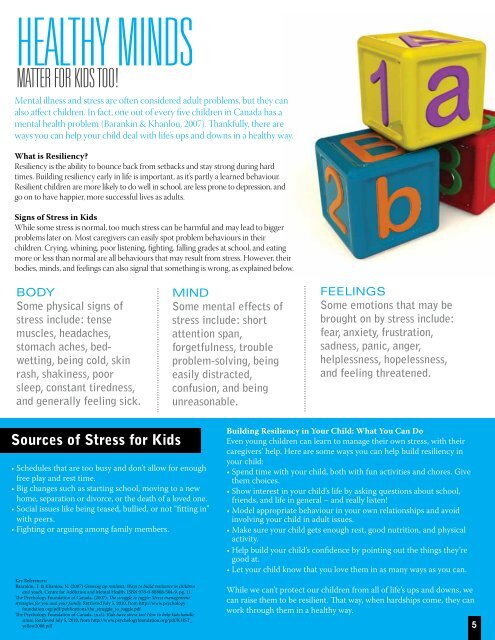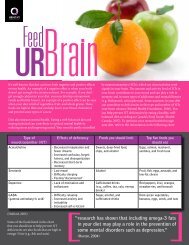Healthy Minds Matter Newsletter and Brochure (pdf)
Healthy Minds Matter Newsletter and Brochure (pdf)
Healthy Minds Matter Newsletter and Brochure (pdf)
You also want an ePaper? Increase the reach of your titles
YUMPU automatically turns print PDFs into web optimized ePapers that Google loves.
<strong>Healthy</strong> <strong>Minds</strong><strong>Matter</strong> for Kids Too!Mental illness <strong>and</strong> stress are often considered adult problems, but they canalso affect children. In fact, one out of every five children in Canada has amental health problem (Barankin & Khanlou, 2007). Thankfully, there areways you can help your child deal with life’s ups <strong>and</strong> downs in a healthy way.What is Resiliency?Resiliency is the ability to bounce back from setbacks <strong>and</strong> stay strong during hardtimes. Building resiliency early in life is important, as it’s partly a learned behaviour.Resilient children are more likely to do well in school, are less prone to depression, <strong>and</strong>go on to have happier, more successful lives as adults.Signs of Stress in KidsWhile some stress is normal, too much stress can be harmful <strong>and</strong> may lead to biggerproblems later on. Most caregivers can easily spot problem behaviours in theirchildren. Crying, whining, poor listening, fighting, falling grades at school, <strong>and</strong> eatingmore or less than normal are all behaviours that may result from stress. However, theirbodies, minds, <strong>and</strong> feelings can also signal that something is wrong, as explained below.BODYSome physical signs ofstress include: tensemuscles, headaches,stomach aches, bedwetting,being cold, skinrash, shakiness, poorsleep, constant tiredness,<strong>and</strong> generally feeling sick.MINDSome mental effects ofstress include: shortattention span,forgetfulness, troubleproblem-solving, beingeasily distracted,confusion, <strong>and</strong> beingunreasonable.FEELINGSSome emotions that may bebrought on by stress include:fear, anxiety, frustration,sadness, panic, anger,helplessness, hopelessness,<strong>and</strong> feeling threatened.Sources of Stress for Kids• Schedules that are too busy <strong>and</strong> don’t allow for enoughfree play <strong>and</strong> rest time.• Big changes such as starting school, moving to a newhome, separation or divorce, or the death of a loved one.• Social issues like being teased, bullied, or not “fitting in”with peers.• Fighting or arguing among family members.Key References:Barankin, T. & Khanlou, N. (2007) Growing up resilient: Ways to build resilience in children<strong>and</strong> youth. Centre for Addiction <strong>and</strong> Mental Health. ISBN 978-0-88868-504-9, pg. 11.The Psychology Foundation of Canada. (2007). The struggle to juggle: Stress managementstrategies for you <strong>and</strong> your family. Retrieved July 5, 2010, from http://www.psychologyfoundation.org/<strong>pdf</strong>/publications/the_struggle_to_juggle.<strong>pdf</strong>The Psychology Foundation of Canada. (n.d.). Kids have stress too! How to help kids h<strong>and</strong>lestress. Retrieved July 5, 2010, from http://www.psychologyfoundation.org/<strong>pdf</strong>/KHST_yellow2008.<strong>pdf</strong>Building Resiliency in Your Child: What You Can DoEven young children can learn to manage their own stress, with theircaregivers’ help. Here are some ways you can help build resiliency inyour child:• Spend time with your child, both with fun activities <strong>and</strong> chores. Givethem choices.• Show interest in your child’s life by asking questions about school,friends, <strong>and</strong> life in general – <strong>and</strong> really listen!• Model appropriate behaviour in your own relationships <strong>and</strong> avoidinvolving your child in adult issues.• Make sure your child gets enough rest, good nutrition, <strong>and</strong> physicalactivity.• Help build your child’s confidence by pointing out the things they’regood at.• Let your child know that you love them in as many ways as you can.While we can’t protect our children from all of life’s ups <strong>and</strong> downs, wecan raise them to be resilient. That way, when hardships come, they canwork through them in a healthy way.5







